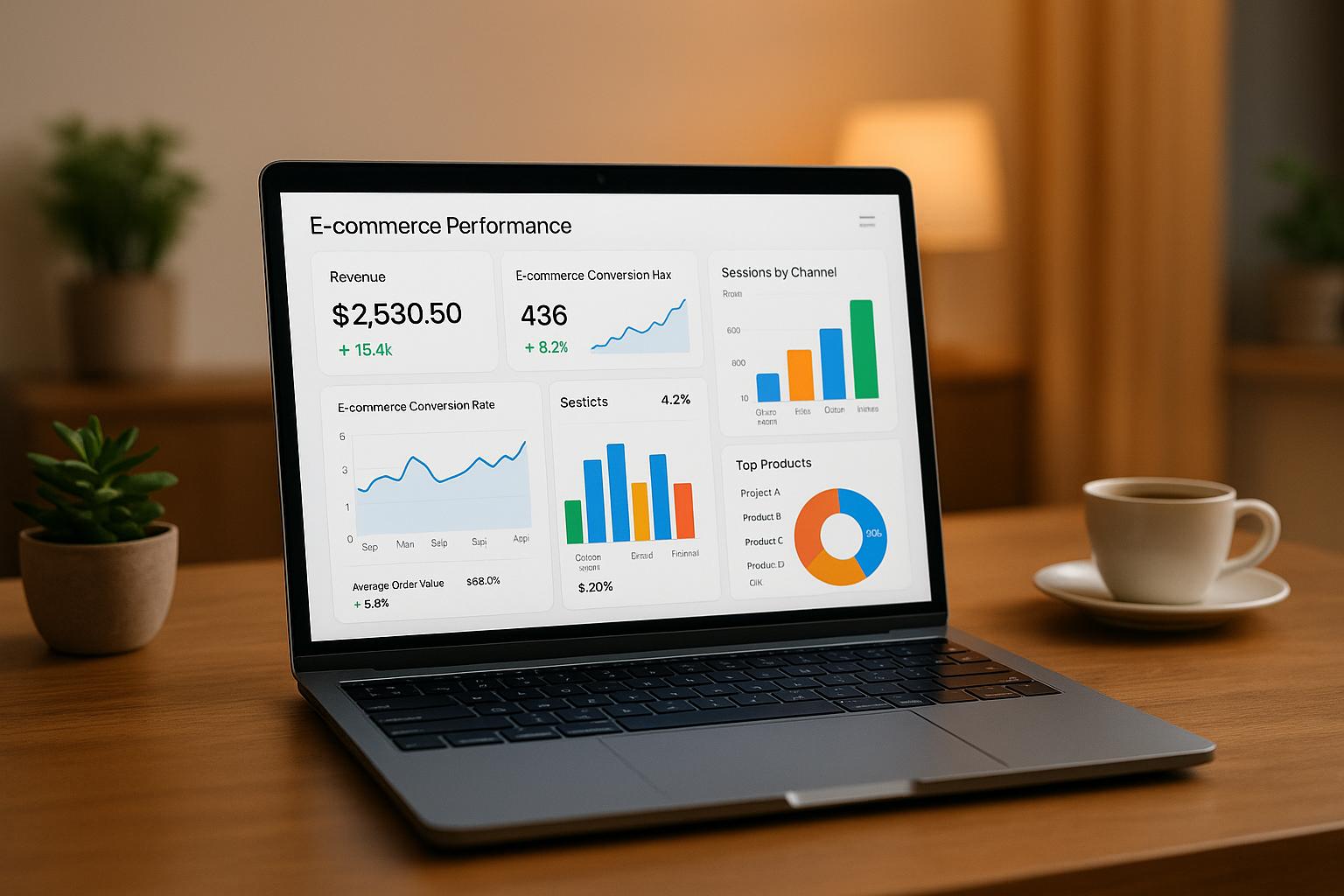When it comes to web analytics, GDPR compliance is a major concern - especially for U.S. businesses dealing with European users. Google Analytics often raises questions about its compliance due to data transfer practices, leading many to seek alternatives that prioritize privacy and meet legal standards. Below are seven GDPR-compliant alternatives to Google Analytics, each offering unique features and hosting options:
- Matomo: Open-source platform with on-premise and cloud hosting in the EU. Offers tools like IP anonymization, consent management, and customizable features.
- Plausible Analytics: Lightweight, cookie-free, and EU-hosted. Focuses on simplicity and aggregated insights.
- Fathom Analytics: Privacy-first, cookie-free solution with global hosting compliant with EU standards.
- Piwik PRO Analytics Suite: Enterprise-grade solution with robust privacy tools, consent management, and flexible hosting (cloud or on-premise).
- Jetpack Stats: Basic WordPress analytics with cookie-free tracking but limited advanced features.
- Heap: Tracks all user interactions automatically and includes strong privacy controls. Cloud-only hosting.
- Simple Analytics: EU-hosted, cookie-free, and straightforward for smaller websites.
Each tool balances privacy, functionality, and ease of use differently, making it essential to choose based on your business size, technical needs, and budget.
Quick Comparison
| Tool | GDPR Compliance | Hosting Options | Pricing | Best For |
|---|---|---|---|---|
| Matomo | Consent management, IP anonymization | EU cloud or on-premise | Free (self-hosted) or $23/month (cloud) | Mid-size businesses needing detailed analytics |
| Plausible | Cookie-free, aggregated data | EU-only hosting | Starts at $9/month | Small websites prioritizing simplicity |
| Fathom | Cookie-free tracking | Global, GDPR-compliant | Subscription-based | Agencies or multi-site management |
| Piwik PRO | Advanced privacy tools | EU cloud or on-premise | Free tier; $299+/month | Enterprises with complex data needs |
| Jetpack Stats | Basic privacy features | Automattic's U.S. hosting | Free or $4.95+/month | WordPress sites needing basic insights |
| Heap | Privacy-focused, auto-tracking | Cloud-only | Custom pricing | Large businesses requiring in-depth behavior tracking |
| Simple Analytics | GDPR-compliant, no cookies | EU-only hosting | $9+/month | Small businesses with straightforward needs |
Choosing the right tool depends on your priorities: privacy, budget, ease of setup, or advanced features. Whether you're managing a small blog or a large enterprise, there's a GDPR-compliant solution to fit your needs.
The top GDPR-compliant analytics tools
1. Matomo
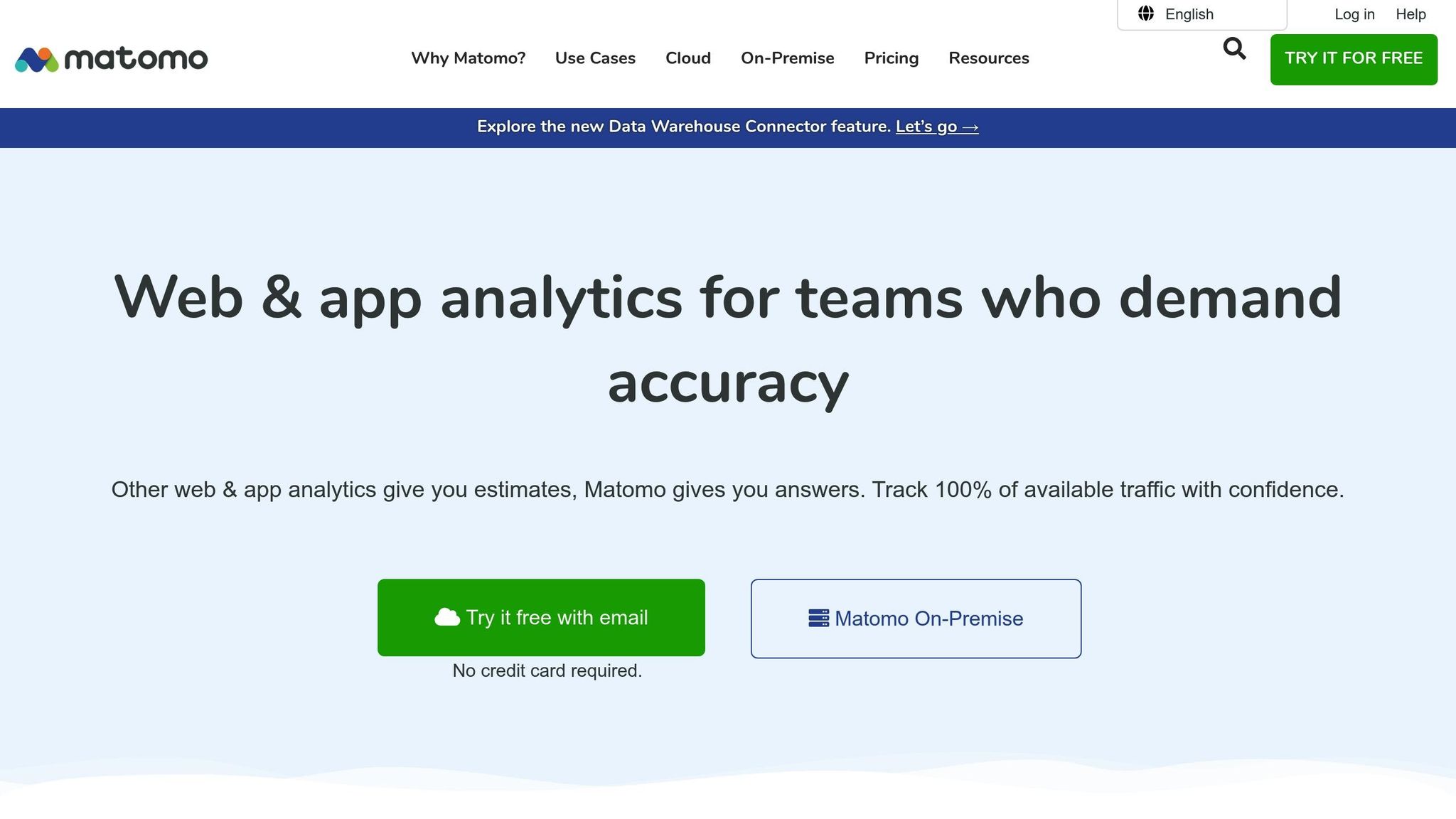
Matomo is a GDPR-compliant analytics platform that prioritizes data privacy and ownership. Formerly known as Piwik, this open-source solution has grown into a well-rounded tool designed to meet the needs of businesses focused on privacy and compliance.
GDPR Compliance Features
Matomo is built with GDPR compliance at its core. It follows a data minimization approach, ensuring only essential information is collected for analytics purposes. Users have full control over what data is tracked, with options to anonymize IP addresses and honor Do Not Track settings.
The platform also includes a GDPR Manager, which simplifies compliance tasks. This tool handles automatic data deletion, manages user consent, and provides detailed audit trails. Unlike many other analytics platforms, Matomo ensures your data stays private by not sharing it with third parties.
Hosting Options
Matomo provides two hosting options to suit different needs:
- On-Premise: This version is free and allows you to host Matomo on your own servers. It’s an excellent choice for organizations with strict data residency requirements, as all data remains under your control.
- Matomo Cloud: For those who prefer a managed solution, Matomo Cloud takes care of the technical workload while maintaining GDPR compliance. Hosted in Frankfurt, Germany, it ensures adherence to European data protection standards, making it a solid option for U.S. businesses serving European customers.
Pricing
Matomo’s pricing depends on the hosting option you choose:
-
On-Premise: While free to download and use, hosting and maintenance costs are your responsibility. Premium features can be added for additional fees:
- Activity Log: From $35/year
- WooCommerce Analytics: From $41/year
- Funnels: From $205/year
- Heatmap & Session Recording: From $233/year
- A/B Testing: From $233/year
- Matomo Cloud: Starts at $23/month for 50,000 monthly hits, with a 17% discount for annual billing. Costs increase with traffic volume, which can make it pricier for high-traffic websites compared to other GDPR-compliant tools.
Suitability for U.S. Businesses
Matomo is particularly appealing for U.S. businesses handling European or international data. Its complete data ownership model aligns well with organizations prioritizing privacy and compliance. The On-Premise version is a cost-effective choice for small businesses, while larger companies may find the managed Matomo Cloud more convenient. For enterprises, custom plans with advanced features and dedicated support are available to address specific compliance needs.
With features like support for unlimited websites, team members, and extended data retention, Matomo provides a scalable solution for businesses aiming for long-term growth. Unlike many analytics tools, it avoids data sampling, ensuring you get the full picture of your analytics.
2. Plausible Analytics
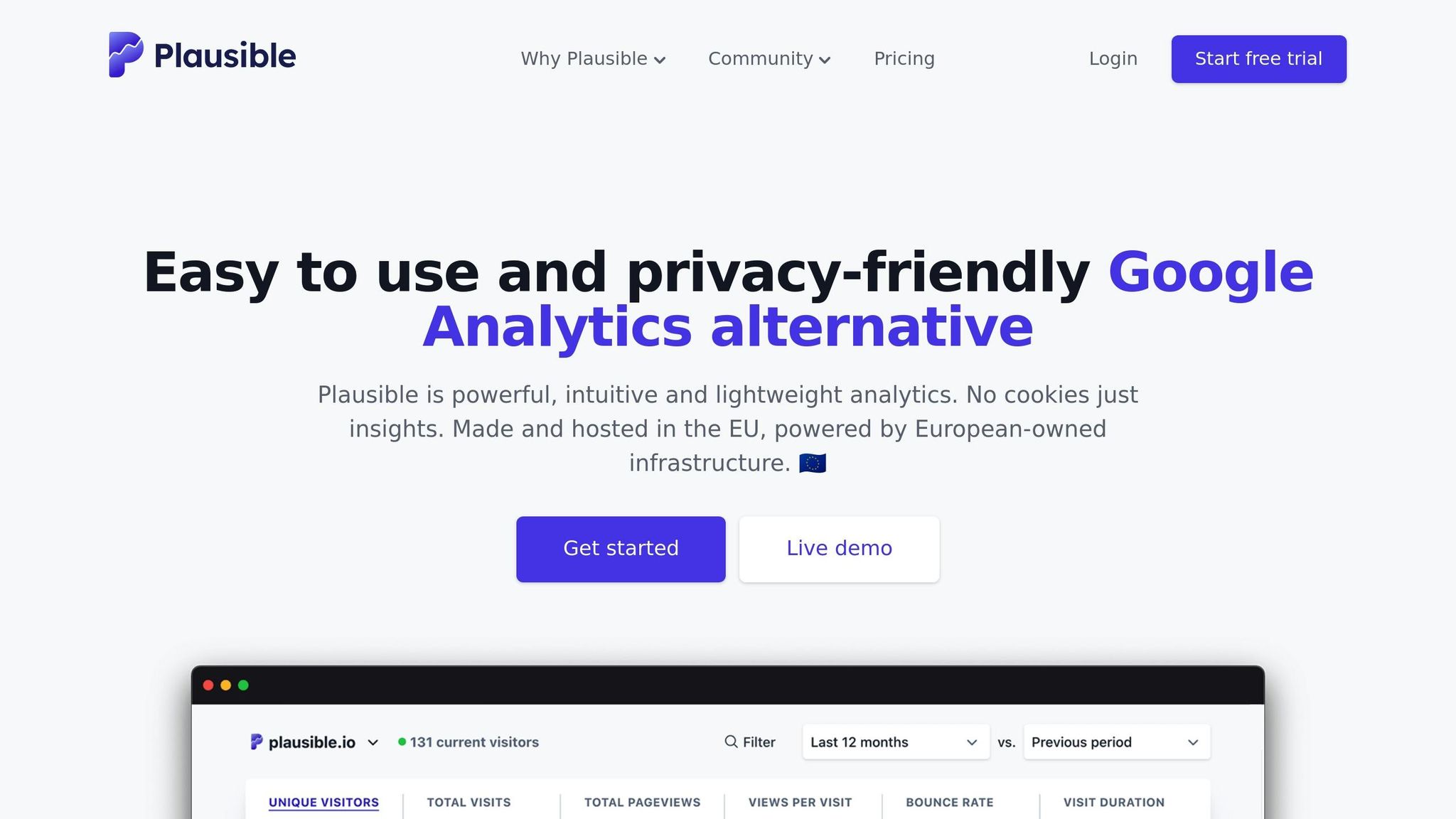
Plausible Analytics takes a privacy-first approach to web analytics, offering a lightweight, open-source solution that's built to comply with privacy laws right out of the box. This makes it a standout choice for businesses looking to prioritize user privacy without sacrificing functionality.
GDPR Compliance Features
Plausible’s design eliminates the need for cookies and tracking, ensuring compliance with GDPR, CCPA, and PECR without requiring extra configuration. By avoiding the collection of personal data or personally identifiable information (PII), it processes data anonymously and focuses only on aggregated insights. There's no cross-site or cross-device tracking, meaning individual visitors remain unidentifiable across sessions.
All data is processed on servers owned by European companies, and visitor information stays within the EU. This setup allows U.S.-based businesses to sidestep the complications of cookie banners and overly detailed privacy policies tied to analytics tools.
Hosting Options
Plausible operates exclusively as a cloud-based service, hosting all data on European servers to maintain strict privacy standards. By managing its own infrastructure, the platform ensures consistent compliance and eliminates the need for businesses to handle server maintenance or technical upkeep. Its open-source codebase adds an extra layer of transparency, allowing anyone to review and verify its privacy claims. This approach makes it a dependable choice for businesses with specific privacy concerns.
Suitability for U.S. Businesses
Plausible is tailored for smaller websites, blogs, portfolios, and SaaS startups that value privacy and simplicity. Its script is 75 times smaller than Google Analytics, which not only speeds up page load times but also enhances SEO and user experience. For companies juggling data regulations across multiple jurisdictions, Plausible’s built-in compliance offers a hassle-free solution.
3. Fathom Analytics
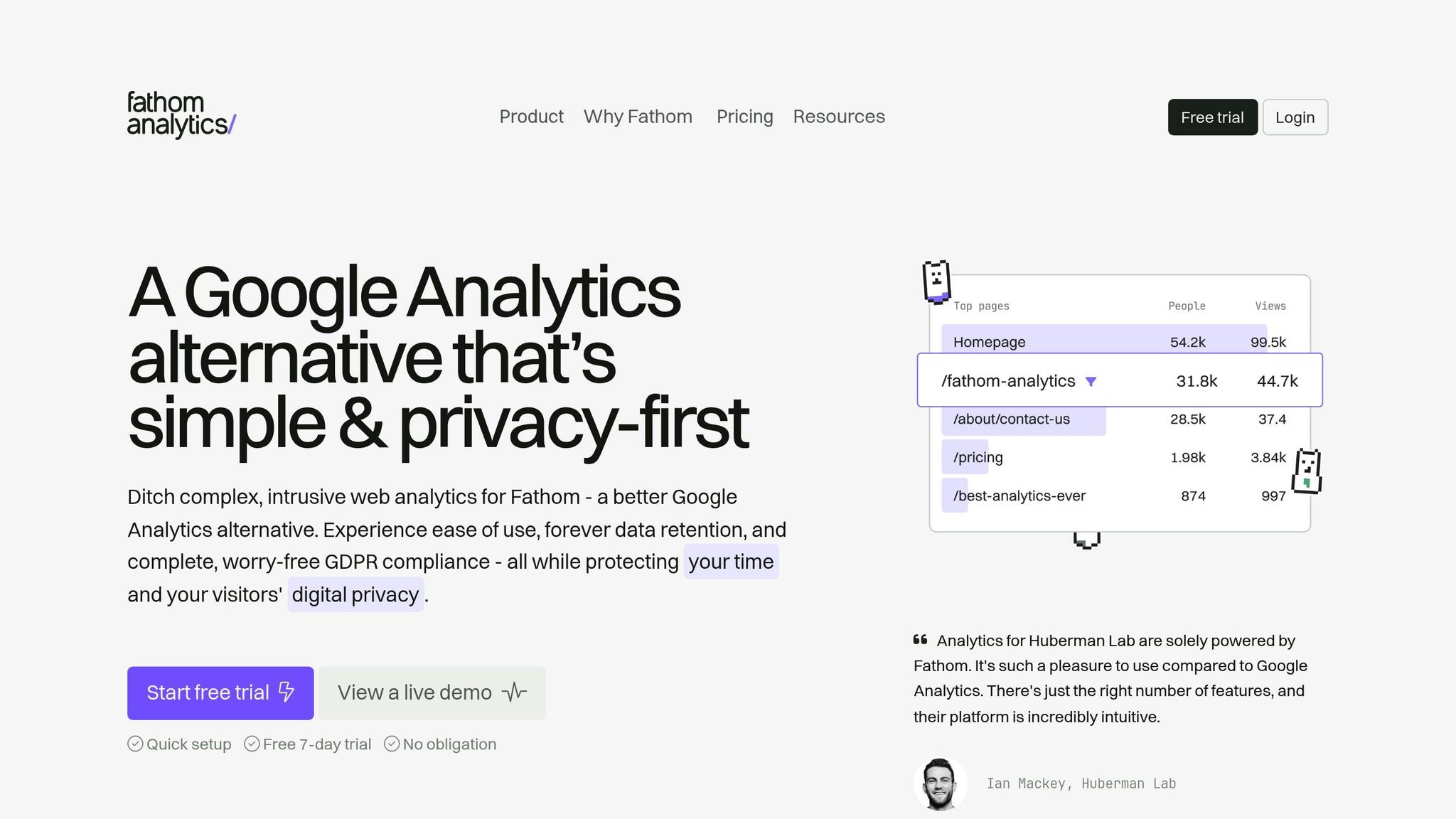
Fathom Analytics stands out as a privacy-focused analytics platform designed to comply with GDPR regulations. For specifics on its features, hosting options, and pricing, it's best to check the vendor's official website for the most accurate and current details.
4. Piwik PRO Analytics Suite
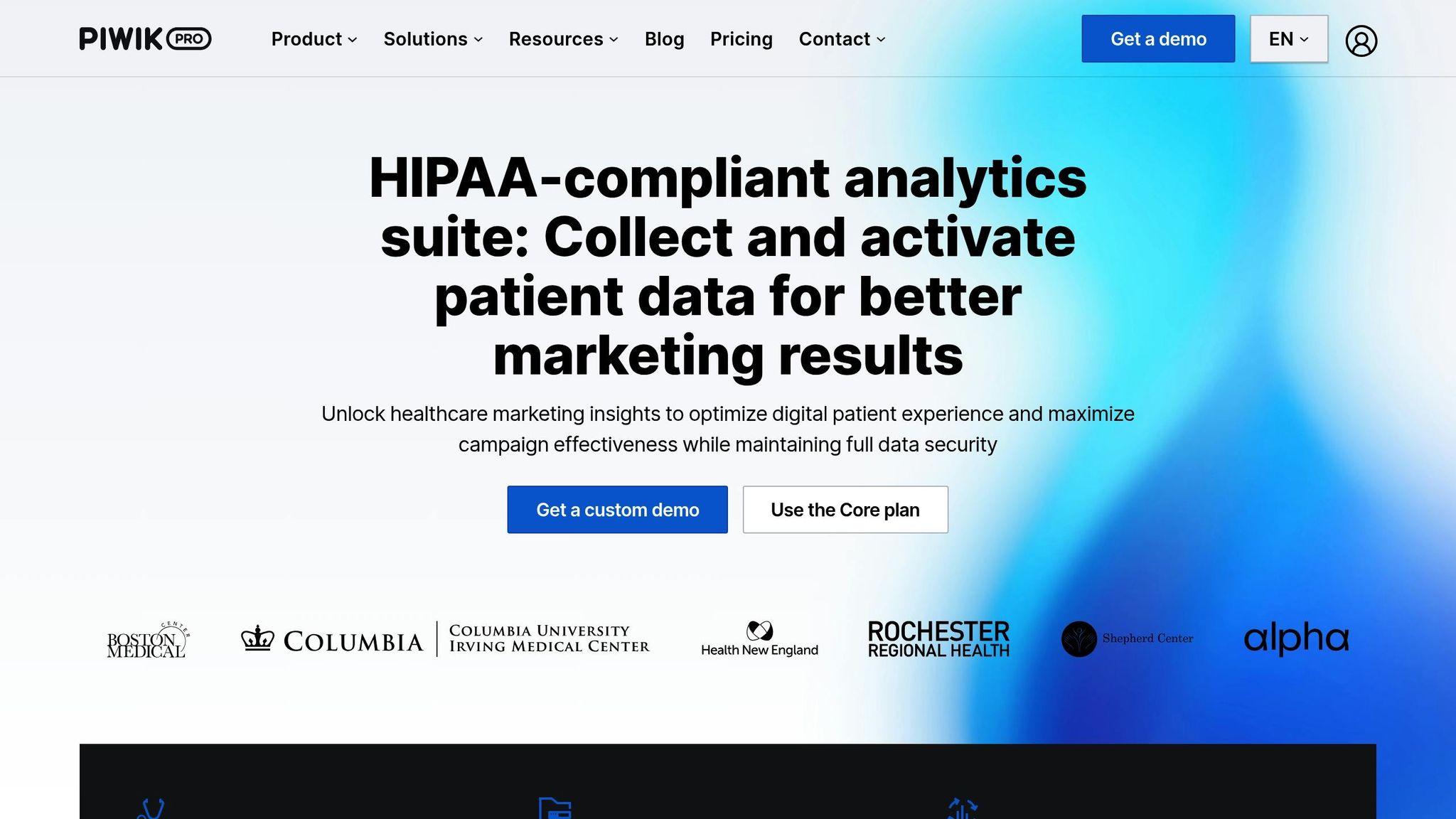
Piwik PRO Analytics Suite is a robust analytics platform designed with a focus on data privacy. As a European-based solution, it offers businesses detailed insights while ensuring strict compliance with privacy regulations.
GDPR Compliance Features
Piwik PRO makes navigating GDPR requirements straightforward with its built-in privacy tools. The platform processes data securely, avoiding the need to transfer personal information to third parties. This allows businesses to maintain full control over their data. It also includes consent management tools, enabling visitors to easily opt-in or opt-out of tracking.
The suite’s data anonymization feature ensures visitor information is pseudonymized, preventing the identification of individual users without additional data. This strikes a balance between gathering meaningful analytics and respecting user privacy. Additionally, audit trails document every data processing activity, simplifying compliance during regulatory reviews. These privacy measures are seamlessly integrated into the platform's hosting options.
Hosting Options
Piwik PRO offers two hosting choices: cloud-hosted and on-premises.
- The cloud-hosted option operates on European servers, ensuring data stays within EU jurisdiction and aligns with regional data protection laws. This is ideal for businesses that prioritize GDPR compliance but prefer not to manage infrastructure themselves.
- The on-premises option gives organizations complete control over their data. Companies can install the platform on their own servers, ensuring sensitive information remains within their internal network. This option suits enterprises in highly regulated industries or those with stringent data governance policies.
These hosting options also influence the platform’s pricing structure.
Pricing
Piwik PRO’s pricing is structured around monthly page views and feature access.
- A free version supports up to 500,000 page views per month, making it a great starting point for smaller businesses or those testing the platform.
- Paid plans start at $299/month for the Core plan, which includes features like custom reporting, API access, and priority support.
- For larger enterprises, custom pricing is available. These plans offer unlimited page views and advanced compliance tools tailored to specific needs.
Suitability for U.S. Businesses
Piwik PRO Analytics Suite is particularly valuable for U.S. businesses managing international operations or serving European customers. Its cross-border compliance capabilities help American companies navigate complex privacy regulations without compromising analytics functionality.
The platform’s enterprise-grade security is especially appealing to U.S. organizations in industries like healthcare, finance, and e-commerce. These sectors often handle sensitive data and benefit from Piwik PRO’s ability to deliver detailed analytics while meeting stringent data protection standards that go beyond many U.S. requirements.
sbb-itb-5174ba0
5. Jetpack Stats
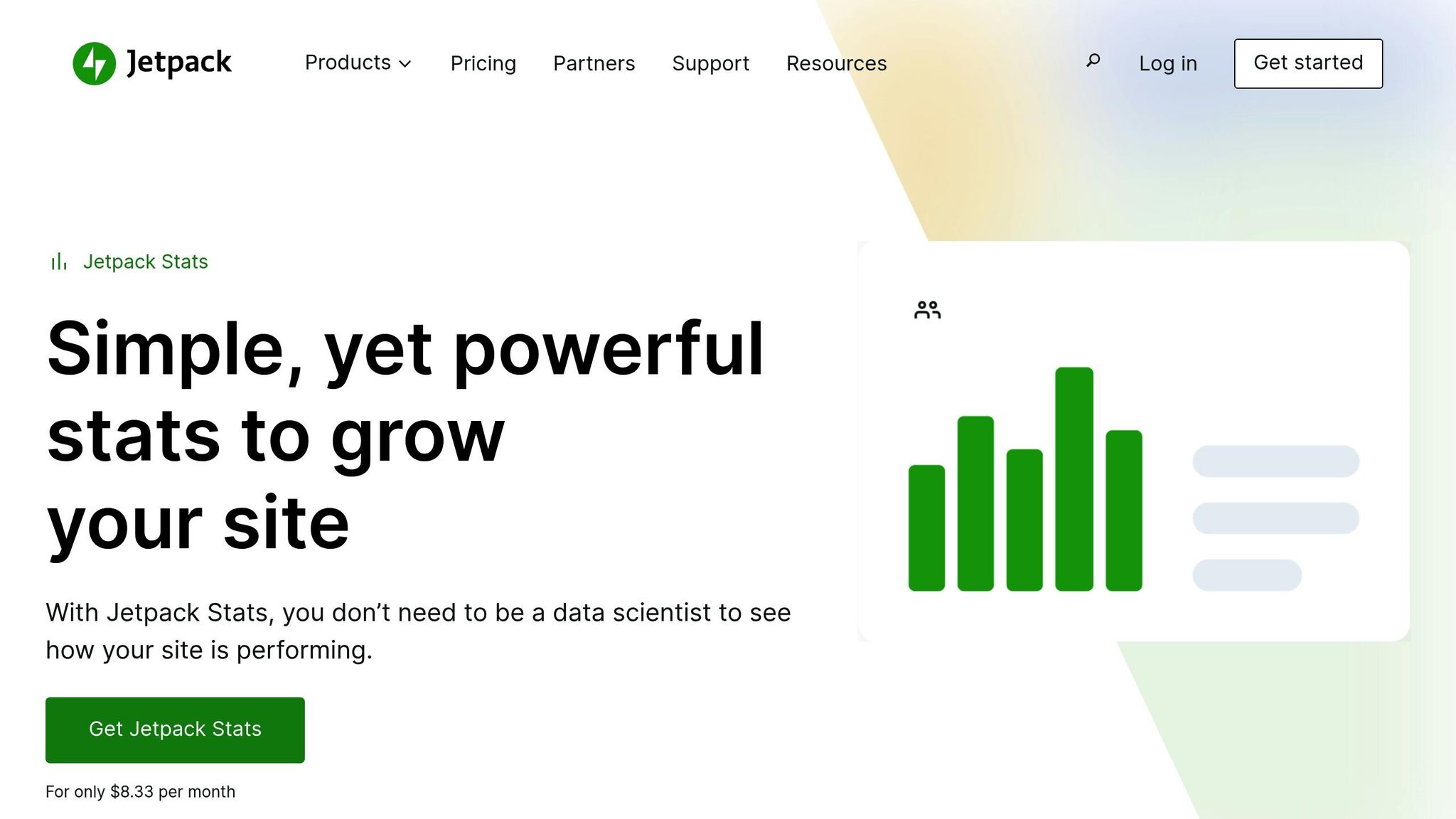
Jetpack Stats, part of the Jetpack plugin suite from Automattic, offers straightforward analytics tailored for WordPress sites. It stands out for its simplicity and privacy-focused design, making it a solid choice for U.S. businesses that need basic insights without sacrificing user data protection.
GDPR Compliance Features
Jetpack Stats takes a privacy-conscious approach that aligns with GDPR standards. Instead of relying on cookies, it uses server-side analytics to capture data such as page views, referrers, and general geographic information. Importantly, it avoids collecting personally identifiable information.
To protect visitor privacy, the tool anonymizes IP addresses by trimming the final segment. This still allows for useful geographic insights at the country and city level while avoiding the need for intrusive cookie consent banners. Automattic’s detailed privacy policy further supports transparency, outlining how data is handled and ensuring no detailed user profiles or cross-session tracking are created. This makes Jetpack Stats a privacy-friendly alternative to traditional analytics platforms.
Hosting Model
Jetpack Stats operates exclusively on Automattic’s WordPress.com servers, which are based in the U.S. This centralized hosting simplifies setup and maintenance, as users don’t need to manage server configurations or data storage.
However, this hosting approach does limit control over where data is stored. For businesses needing to comply with strict data localization requirements, this could pose challenges. Still, for most U.S. businesses, the ease of use outweighs these limitations, especially for those not bound by stringent geographic data restrictions.
Pricing
Jetpack Stats follows a freemium model, making it accessible to a wide range of users.
- Free Plan: Offers analytics for the last 30 days.
- Paid Plans: Start at $4.95/month, adding features like extended data retention and spam protection.
- Premium Plan: At $19.95/month, includes advanced analytics.
- Professional Plan: For $39.95/month, provides enhanced reporting and comprehensive site management tools.
This tiered pricing ensures options for businesses of various sizes and needs.
Best Fit for U.S. Businesses
Jetpack Stats is particularly well-suited for small to medium-sized U.S. businesses running WordPress sites. Its user-friendly interface and minimal setup requirements make it an appealing choice for those who need basic traffic insights without the complexity of enterprise-level tools.
The cookie-free tracking is a major advantage for businesses serving international customers, simplifying compliance with diverse privacy regulations. However, companies needing detailed user behavior tracking, conversion metrics, or advanced segmentation may find its capabilities too limited.
For WordPress-based businesses in fields like professional services, small retail, or content creation, Jetpack Stats delivers practical insights into traffic and content performance. Its privacy-first design helps build trust with visitors while offering enough analytics to guide decision-making effectively.
6. Heap
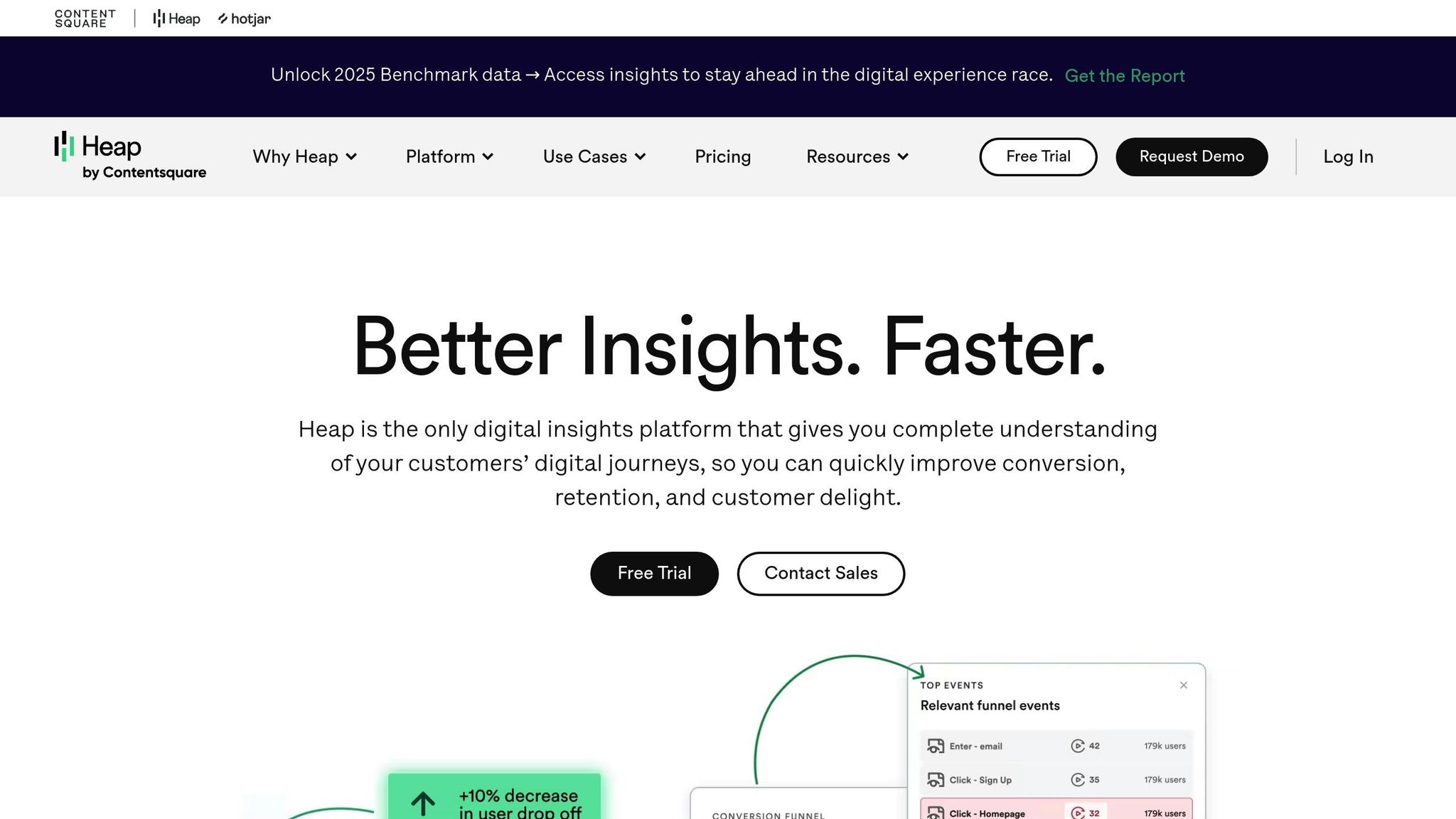
Heap takes a different approach to web analytics by automatically tracking every user interaction on your website - no need for manual event tracking. This all-in-one data collection method, paired with robust privacy features, makes it an attractive option for U.S. businesses seeking detailed behavioral insights while adhering to GDPR standards.
GDPR Compliance Features
Heap offers multiple tools to help businesses meet GDPR regulations. With features like the Target Text Autocapture toggle and the disableTextCapture API, you can block the capture of sensitive text effortlessly. When both are enabled, Heap enforces the highest level of privacy by default.
Another key feature is Heap Redact, which ensures that sensitive text, attributes, or page titles never reach Heap's servers. The platform also determines a user’s approximate geographic location without recording their IP address, providing additional privacy controls.
Heap addresses GDPR's "right to erasure" through its User Deletion API, an in-app deletion tool, and Postman support, making it easier for technical teams to comply with data deletion requests.
To further bolster compliance, Heap includes GDPR requirements in its Data Processing Addendum (DPA), along with Standard Contractual Clauses for legal data transfers from the EU/EEA to the U.S. For privacy-related concerns, Heap has a dedicated Data Protection Officer (DPO), reachable at dpo@heap.io.
Hosting Options
Heap operates exclusively on a cloud-based infrastructure hosted in SOC 2-certified facilities. While this simplifies deployment and ongoing maintenance, it does limit control over data localization. All data is processed within Heap's managed cloud environment, which meets high security standards, as evidenced by its ISO 27001, 27701, 27017, and 27018 certifications.
Pricing
Heap uses a usage-based pricing model that adjusts based on data volume and feature requirements. While specific pricing details aren’t publicly available, the platform typically offers tiered plans based on the number of monthly tracked users and data retention periods.
For smaller websites and startups, Heap often provides a free tier with limited sessions, making it easy to test the platform. Paid plans unlock advanced features like extended data retention, custom integrations, and more detailed user segmentation. Enterprise customers can access custom pricing options, which may include dedicated support, advanced security, and higher data limits. Businesses are encouraged to contact Heap directly for tailored pricing details.
Suitability for U.S. Businesses
Heap stands out for its automatic data capture, which eliminates the hassle of manual event tracking. This capability also enables retroactive analysis, meaning teams can explore user behavior even if specific events weren’t preconfigured. It’s a particularly valuable tool for e-commerce sites, SaaS platforms, and content-heavy websites.
That said, the platform’s cloud-only hosting model may not be ideal for businesses with strict data localization needs. But for companies comfortable with U.S.-based data processing, Heap offers a powerful solution for in-depth analytics. For those serving international markets, Heap’s privacy controls and GDPR compliance features provide the tools needed to navigate regulatory requirements - so long as privacy settings are properly configured during setup.
7. Simple Analytics
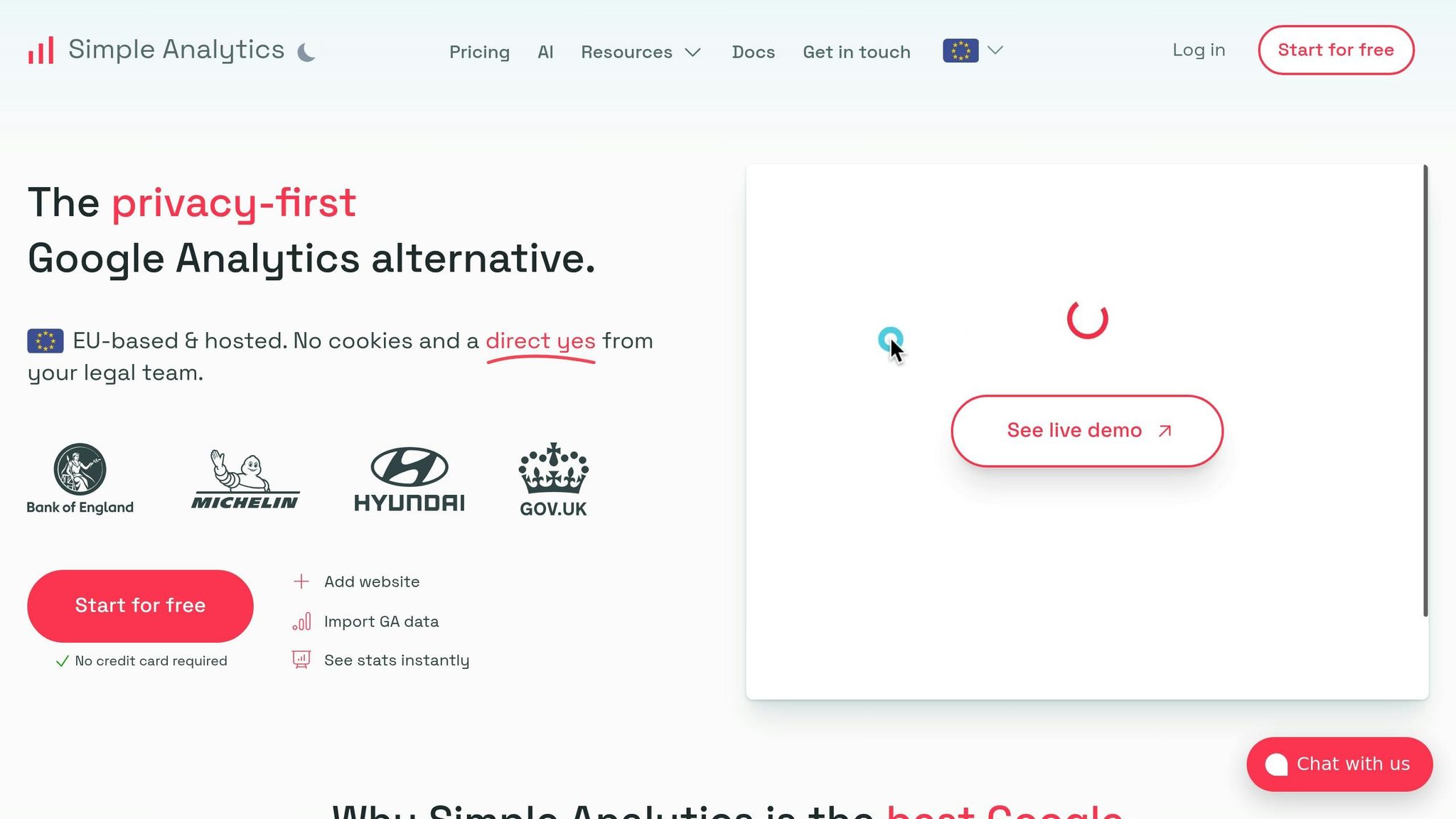
Simple Analytics offers a privacy-first approach to website analytics, designed to meet GDPR requirements without collecting personal data. This EU-based platform focuses on delivering essential insights while avoiding the complexities of privacy management.
GDPR Compliance Features
Simple Analytics is built to comply fully with GDPR and UK GDPR regulations by minimizing data collection. It avoids cookies, IP address storage, and fingerprinting. As the company explains:
"Simple Analytics is 100% GDPR compliant with data protection law from installation. Because it only processes non-personal data, it can satisfy the requirements of the strictest privacy regulation, including the GDPR, the ePrivacy Directive, the UK GDPR, and the PECT." - Simple Analytics
This means no need for cookie banners or consent prompts, yet it remains compliant with GDPR, PECR, CCPA, and UK GDPR. The platform works seamlessly right out of the box, simplifying privacy concerns for its users.
Hosting Options
All of Simple Analytics' infrastructure is hosted within the European Union. Data is stored securely in the Netherlands through Dutch providers Worldstream and Leaseweb, while Bunny CDN, based in Slovenia, ensures fast content delivery. This EU-only hosting model helps U.S. businesses sidestep challenges tied to international data transfers.
Pricing
Simple Analytics uses a straightforward, usage-based pricing model. Plans start at $9 per month for up to 100,000 pageviews, and a 14-day free trial is available. Pricing is based solely on pageview volume, with no hidden fees for extra features or additional users, making it a predictable and budget-friendly option.
Suitability for U.S. Businesses
For U.S. businesses seeking a simple and privacy-focused solution, Simple Analytics is a solid choice. It provides key metrics like pageviews, referrers, and popular pages, all without the hassle of cookie tracking. Its lightweight design improves website load times and helps businesses stay legally compliant. While it lacks advanced features like in-depth user journey mapping or detailed segmentation, it’s ideal for blogs, content-driven websites, and small e-commerce platforms that need basic traffic insights.
Advantages and Disadvantages
Understanding the pros and cons of various analytics tools can help you navigate your GDPR compliance journey. As we delve deeper into GDPR-compliant platforms, it’s clear that each option comes with trade-offs. Evaluating these trade-offs is critical to finding the tool that best suits your business needs.
Privacy-focused tools like Plausible Analytics and Simple Analytics simplify GDPR compliance by removing cookies and consent banners. However, they often lack advanced features such as conversion tracking or detailed journey mapping.
Enterprise-level platforms like Piwik PRO and Heap provide sophisticated analytics capabilities but require more technical expertise and resources to manage.
Hybrid tools such as Matomo offer flexibility with both cloud and self-hosted options, giving you control but requiring additional maintenance efforts.
Here’s a comparison to help U.S. businesses weigh their options:
| Tool | GDPR Compliance | Hosting Options | Pricing | Best For U.S. Businesses |
|---|---|---|---|---|
| Matomo | Cookie-free mode and consent management included | EU cloud hosting or self-hosted | Free self-hosted option; subscription plans for cloud | Mid-size businesses needing robust analytics |
| Plausible Analytics | No cookies; minimal personal data collection | EU-based hosting | Subscription-based, priced by usage | Content sites prioritizing simplicity |
| Fathom Analytics | Cookie-free tracking with built-in GDPR compliance | Global hosting with EU compliance | Subscription-based, priced by usage | Agencies managing multiple client sites |
| Piwik PRO | Advanced consent management and data residency controls | Multi-region hosting, including EU | Free tier available; scalable enterprise plans | Enterprises with complex analytics requirements |
| Jetpack Stats | Basic privacy protections; limited GDPR features | Automattic's global infrastructure | Free for WordPress sites | WordPress-hosted sites needing basic metrics |
| Heap | Advanced privacy controls and data governance | Multi-region hosting | Custom enterprise pricing | Large organizations needing in-depth analytics |
| Simple Analytics | Fully GDPR-compliant without cookies | EU-exclusive hosting | Subscription-based, priced by usage | Small businesses focused on straightforward privacy compliance |
Key Considerations for U.S. Businesses
When choosing the right tool, U.S. businesses should weigh the following factors:
- Cost: Options range from free tools like Jetpack Stats or self-hosted Matomo to enterprise-grade solutions with higher price tags. Free options may save money but often come with limited features or require more technical upkeep. Mid-tier solutions strike a balance between affordability and functionality, while enterprise platforms justify their higher costs with advanced capabilities.
- Setup Complexity: Privacy-first tools like Simple Analytics and Plausible Analytics are easy to implement and require minimal technical expertise. In contrast, enterprise solutions such as Heap or Piwik PRO demand more resources for setup and ongoing management.
- Data Accuracy: Privacy-first tools may underreport traffic due to ad blockers, while traditional analytics platforms capture more comprehensive data. However, traditional tools need careful configuration to stay GDPR-compliant.
For U.S. businesses, international data transfer regulations introduce additional challenges. Tools hosted in the EU, like Simple Analytics, simplify compliance by keeping data within European boundaries. Platforms with global hosting, however, require businesses to carefully review data processing agreements and cross-border transfer mechanisms to ensure compliance with privacy laws.
Lastly, businesses migrating from Google Analytics may find Matomo’s interface more familiar, while tools like Fathom Analytics, with their minimalist design, may require an adjustment in expectations regarding the depth of available metrics.
Conclusion
Choosing the right GDPR-compliant analytics tool comes down to your business size, technical capabilities, and privacy priorities. If you're a small business or content creator, Simple Analytics and Plausible Analytics provide an easy way to stay compliant. Their cookie-free tracking removes the hassle of managing complex consent systems, making them ideal for straightforward needs.
For mid-sized businesses, Matomo stands out. It combines the familiar feel of Google Analytics with strong privacy controls and the flexibility of EU hosting. Whether you prefer a cloud-based or self-hosted setup, Matomo adapts to growing teams with ease.
Larger enterprises managing sensitive data should look into Piwik PRO or Heap. Piwik PRO excels in data governance, offering advanced residency options and detailed consent management. Heap, on the other hand, delivers powerful analytics with a clean, user-friendly interface. While these platforms require a bigger budget and technical expertise, they meet the demands of complex operations.
For WordPress users, Jetpack Stats offers a free and simple solution. However, its limited metrics may mean you'll need additional tools as your tracking needs expand.
Agencies juggling multiple client sites might find Fathom Analytics particularly useful. Its white-label features and simplified billing make managing client accounts easier while staying GDPR-compliant.
Switching from Google Analytics doesn't mean sacrificing insights. Each of these tools offers unique features while adhering to GDPR guidelines. The trick is finding the one that aligns with your business goals and privacy requirements.
Looking for more options? Check out the Marketing Analytics Tools Directory. It’s a one-stop shop for exploring and comparing tools for real-time analytics, campaign tracking, audience insights, and more - helping you discover the perfect fit for both compliance and analytics.
FAQs
What should U.S. businesses look for in a GDPR-compliant analytics tool?
When choosing a GDPR-compliant analytics tool, U.S. businesses should focus on tools that store data in GDPR-approved regions and include features like anonymized data collection or cookie-free tracking. It's also essential that the tool ensures explicit user consent before processing any data. These aspects not only help meet GDPR requirements but also uphold user privacy.
It's equally important to confirm that the tool has clear and transparent privacy policies and adheres to GDPR principles, such as data minimization and respecting user rights. Opting for a tool that combines compliance with strong functionality can safeguard your business while building trust with your audience.
How do tools like Plausible and Simple Analytics comply with GDPR without using cookies?
Privacy-focused analytics tools, such as Plausible and Simple Analytics, take a different approach by prioritizing user anonymity and complying with GDPR regulations. They achieve this by steering clear of cookies and processing only non-personal data. This means they don’t track individual users across sessions or devices, ensuring no personal information is ever collected or stored.
Take Plausible, for instance - it offers cookie-free, anonymous analytics, which eliminates the need for those annoying cookie consent banners. On the other hand, Simple Analytics gathers only the essential, non-identifiable data needed to provide valuable insights while respecting user privacy. Both tools are designed with GDPR compliance in mind, emphasizing transparency and anonymity in their operations.
What are the benefits of using on-premise hosting for GDPR compliance, and which analytics tools provide this option?
Using on-premise hosting for GDPR compliance comes with several advantages. One of the biggest perks is that it gives organizations complete control over their data security and storage. By keeping sensitive information within their own infrastructure, businesses can reduce their dependence on third-party providers. This approach aligns closely with GDPR's strict guidelines for data privacy and handling. Plus, it allows companies to tailor security measures to fit their unique requirements.
If you're looking for analytics tools that support on-premise hosting, there are some excellent options to consider, such as Matomo, Power BI Report Server, Tableau Server, and Looker. These tools are perfect for businesses that prioritize safeguarding their data and staying compliant with regulations, all while retaining flexibility in how they manage their information.

